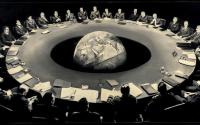Perhaps the defining moment of Tony Blair's premiership was the speech that he gave to the Labour party conference in October 2001. In June, his party had returned to office with a monumental majority. In September, two planes were flown into the World Trade Centre in New York. The speech appeared to mark his transition from the insecure, focus-group junkie of Labour's first term to a visionary and a statesman, determined to change the world.
The most memorable passage was his declaration on Africa. "The state of Africa," he told us, "is a scar on the conscience of the world. But if the world as a community focused on it, we could heal it. And if we don't, it will become deeper and angrier." This being so, I would respectfully ask our visionary prime minister to explain what the hell he thinks he is doing in France.
A few weeks ago, President Chirac did something unprecedented. The head of the state which had formerly prevented any real change to Europe's farm subsidy regime suddenly gave ground. He wanted to show that the G8 summit he is hosting in Evian, which concludes today, would offer something other than just the usual spectacle of the rich and powerful deciding how they would make themselves still richer and more powerful. He approached the US government to suggest that Europe would stop subsidising its exports of food to Africa if America did the same.
His offer was significant, not only because it represented a major policy reversal for France, but also because it provided an opportunity to abandon the perpetual agricultural arms race between the European Union and the US, in which each side seeks to out-subsidise the other.
Our farm subsidies, as Tony Blair has pointed out, are a disaster for the developing world, and particularly for Africa. Farming accounts for some 70% of employment on that continent, and most of the farmers there are desperately poor. Part of the reason is that they are unfairly undercut by the subsidised products dumped on their markets by exporters from the US and the EU. Chirac's proposals addressed only part of the problem, but they could have begun the process of dismantling the system which does so much harm to our pockets, our environment and the lives of some of the world's most vulnerable people.
We might, then, have expected Tony Blair, who created a major diplomatic incident last year when he rightly savaged Chirac for refusing to budge, to have welcomed the lost and heavily subsidised sheep into the free-market fold. But our prime minister, instead, has single-handedly destroyed the French initiative. The reason will by now be familiar. George Bush, who receives substantial political support from US agro-industrialists, grain exporters and pesticide manufacturers, was not prepared to make the concessions required to match Chirac's offer. Had the EU, and in particular the member which claims to act as a bridge across the Atlantic, supported France, the moral pressure on Bush may well have become irresistible. But as soon as Blair made it clear that he would not back Chirac's plan, the initiative was dead.
So, thanks to our conscience-stricken prime minister, and his statesmanlike habit of doing whatever Bush tells him to, Africa is now well and truly stuffed. Every trade distortion Blair once promised to address remains in place. Several of the food crises from which that continent is now suffering are directly exacerbated by the plight of its own farmers.
The underlying problem is that the rich nations set the global trade rules. The current world trade agreement was supposed to have prevented the EU and the US from subsidising their exports to developing nations. But, as the development agency Oxfam has shown, the agreement contains so many loopholes that it permits the two big players simply to call their export subsidies by a different name.
So, for example, the EU has, in several farm sectors, stopped paying farmers according to the amount they produce (which is classified by the World Trade Organisation as a "trade-distorting" subsidy) and started instead to give them direct grants, based on the amount of land they own and how much they produced there in the past. The effect on the prices of the crops they grow is almost identical, but the new subsidies are now classified as "non-distorting".
The US has applied the same formula, and added a couple of tricks of its own. One of these is called "export credit": the state reduces the cost of US exports by providing cheap insurance for the exporters. These credits, against which Chirac was hoping to trade the European subsidies, are worth some $7.7bn (£4.7bn) to US grain sellers. In combination with other ruses, they ensure that American exporters can undercut the world price for wheat and maize by between 10% and 16%, and the world price for cotton by 40%.
But the ugliest of its hidden export subsidies is its use of aid as a means of penetrating the markets of poorer nations. While the other major donors provide food aid in the form of money, which the World Food Programme can use to buy supplies in local markets, thus helping indigenous farmers while feeding the starving, the US insists on sending its own produce. This programme, the government states with breathtaking frankness, is "designed to develop and expand commercial outlets for US commodities".
The result is that the major recipients are not the nations in greatest need, but the nations which can, again in the words of the US department of agriculture, "demonstrate the potential to become commercial markets" for US farm products. This is why, for example, the Philippines currently receives more US food aid than Mozambique, Malawi, Zambia and Zimbabwe put together, all of which, unlike the Philippines, are currently suffering from serious food shortages. In a way, this is a blessing for Africa: if the US dumped as much of its produce on the nations that need it as it does on the nations that don't, it would destroy their fragile agricultural economy.
But US policy also ensures that food aid is delivered just when it is needed least. Oxfam has produced a graph plotting the amount of wheat given to developing nations by the US against world prices. When the price falls (in other words, when there is a global surplus and poor nations can buy food cheaply) the volume of "aid" rises. This is as clear a demonstration of agricultural dumping as you could ask for. The very programme which is meant to help the poor is in fact undermining them. It casts an interesting light on Bob Geldof's astonishing claim last week that Bush has become the champion of the poor.
So, when faced with a choice between saving Africa and saving George Bush from a mild diplomatic embarrassment, Blair has, as we could have predicted, done as his master bids. The scar on the conscience of the world has just become deeper and angrier.
·George Monbiot's book, The Age of Consent: A Manifesto for a New World Order will be published on June 16.






